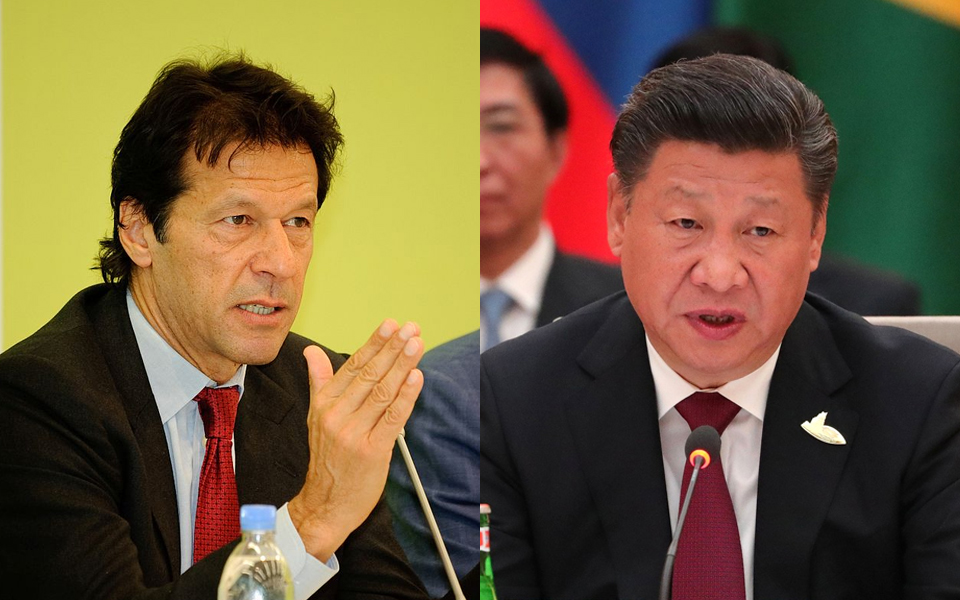
The ‘key’ that ‘unlocked’ United Nations Masood Azhar decision

A series of disparate, yet related, developments appear to have led to the United Nations Security Council designating the Pulwama attack mastermind Masood Azhar as a terrorist.
The key to the decision was a meeting on April 28 between Pakistan Prime Minister Imran Khan and Chinese President Xi Jinping in Beijing. Though reports, quoting the two leaders, merely said the talks centred on Indo-Pakistan relationship and did not specify Azhar’s issue at the UNSC, Imran Khan most likely gave the green signal to China to drop its hold and allow the chief of the Jaish-e-Muhammad to be designated a terrorist.
Xi described China and Pakistan as “iron friends” and that they had “always firmly supported each other on issues concerning each other’s core interests”. This being the case it was obvious that Beijing would not have moved on the Azhar case without Imran Khan’s concurrence.
The Chinese too were under pressure from the movers of the UNSC resolution – the US, UK and France – besides Indian persistence. On April 22, Indian foreign secretary Vijay Gokhale had met Chinese Foreign Minister Wang Yi in Beijing on the issue.
After the Xi-Khan meeting Chinese officials indicated that the issue was leading to a resolution. And, that came true on Wednesday, in what is being considered a major relief and a diplomatic victory for India. For New Delhi, this is the second time in over a decade that it has succeeded in this task. The first was in designating the Lashkar-e-Taiba a.k.a Jamaat ud Dawa chief Hafeez Sayeed as a terrorist at the UNSC on December 10, 2008, following the Mumbai 26/11 terror attacks that he spearheaded.
Since the Pulwama attack on February 14, Imran Khan has harped on peace with India and acted on his statement by releasing Indian wing commander Abhinandan Varthaman who was captured after his aircraft went down during a skirmish across the border following the retaliatory Balakot strike 12 days later.
In the suicide attack in Kashmir’s Pulwama district, claimed by the JeM, at least 40 personnel of India’s Central Reserve Police Force (CRPF) were killed.
The reason why Khan has sent out conciliatory signals since the Pulwama attack is because of a threat hanging over Pakistan for nearly a year now. In June 2018, the powerful Paris-based Financial Action Task Force (FATF) placed Pakistan on the ‘grey list” of countries whose domestic laws are considered weak to tackle money-laundering and terror financing.
Pakistan was shocked to be placed on the grey list as for the first time it was being held accountable by the international community for harbouring groups that engaged in terrorist activities. The FATF, an inter-governmental body created by the G7 countries in 1989, is responsible for setting global standards on anti-money laundering and combating the financing of terrorism.
What makes FATF potent is the fact that its members include 38 countries and major financial institutions across the globe. Pakistan’s foreign office reportedly said the country would lose at least $10 billion annually if it continued on the grey list. If it were to get pushed into the black list, the country’s foreign minister S M Qureshi was quoted as saying they were still calculating what kind of losses they would have to bear. Being on the blacklist is almost equivalent to international economic sanctions, with serious repercussions.
Pakistan is not a member of the FATF while India became an observer in 2006. Four years later, in 2010 it became a full-fledged member. Diplomatically it placed India at an advantage and lobbying from within appears to have paid off, a factor that Qureshi conceded in conversations with the media.
Having placed Pakistan in the intermediate grey list, FATF directed the country to specify clearly how and in what manner it had tightened its financial system to curb terror financing. One meeting is scheduled in mid-May followed by another in June.
Even while Pakistan was preparing itself to show that it was complying with the FATF requirements came the Pulwama attack on February 14 that completely threw it off course. Compounding the situation, the JeM immediately claimed responsibility. The FATF believes that no terrorist group, like the JeM, can function without access to funds. With the June meeting looming large, for a slippage into the black list to be prevented, Pakistan had to necessarily do something concrete to restore its credibility and hope to get let off the hook by the FATF.
In addition, the United States, United Kingdom and France have also persevered with the move to designate Azhar and back India at the FATF because of strained relations with Pakistan since the 9/11 terror attacks. Successive US governments, for instance, have expressed anger at Islamabad’s perceived support of the Taliban and the Haqqani group, both of which have been responsible for attacks on Western troops across the border in Afghanistan.
The implications are ominous for Pakistan which while suffering the consequences of terrorism in its own soil has also been accused of failing to curb armed groups functioning from its territory that have created havoc in India and Afghanistan. The Imran Khan government seems to have read the writing on the wall, and hopefully some peace will now prevail in the neighbourhood.


